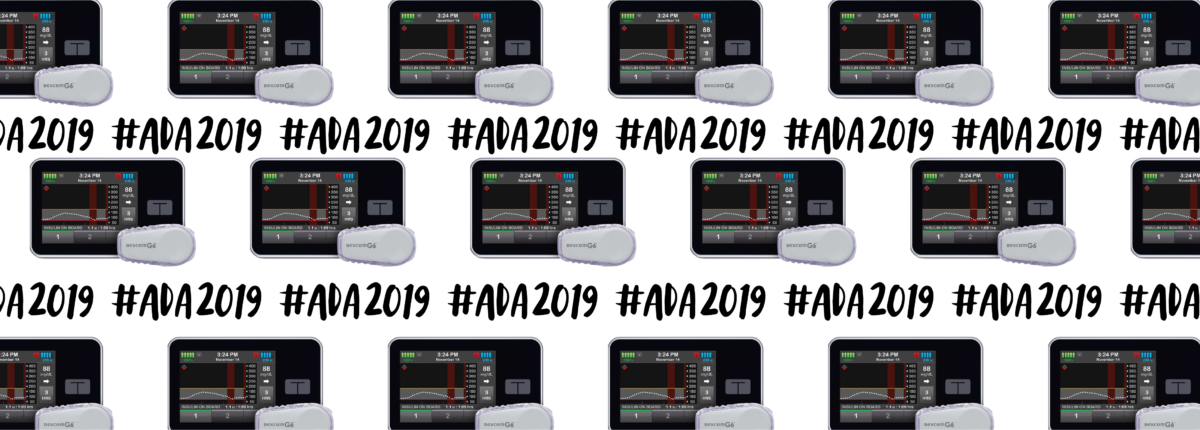Exciting Trial Results for Tandem’s Control-IQ Hybrid Closed Loop System
Editor’s Note 8/13/19: Tandem has submitted the Control-IQ hybrid closed loop algorithm for FDA approval, putting the software on track for a late 2019 approval and possible launch.
On June 9, 2019 Sue Brown MD from the University of Virginia presented results from the trial of Tandem’s Control-IQ hybrid closed loop using the t:slim X2 insulin pump with the Dexcom G6 continuous glucose monitor.
The objective of the study was to assess safety and efficacy of long-term closed loop use (CLC group) compared to use of a pump and sensor alone (SAP group). The 26-week (six-month) randomized control trial studied 168 participants, aged 14 to 61 years old, who had type 1 diabetes for at least one year. 112 participants used the closed loop system and 56 used a traditional pump and sensor with no loop functionality. All participants used the t:slim X2 Insulin Pump and Dexcom G6, and the 112 in the CLC study group used the Control-IQ algorithm, developed at the University of Virginia and in development since 2012.
Features of the Control-IQ algorithm include automated insulin correction boluses for high blood sugars in addition to basal rate modulation, a dedicated hypoglycemia safety system (like currently available Basal-IQ), and gradually intensified control over night to reach 6.1-6.7 mmol/L110-120 mg/dL by morning.
Across 26 weeks, the group using Control-IQ performed better in every measurable outcome in the study.
The primary objective was to see if there was a significant difference in time in range (3.9-10.0 mmol/L70-180 mg/dL) for those using the hybrid closed loop system. Time in range increased 11% (up to 71%) for those using the Control-IQ system, which translates to an additional 2.5 hours every day spent between 3.9-10.0 mmol/L70-180 mg/dl. The time in range improvement was near instant, with an over 70% time in range only one month into the trial for those on the closed loop. The most marked difference was overnight (from midnight to 6am) where closed loop participants saw time in range reach 76%.
The HbA1c for the closed loop users decreased from a mean of 7.4% at the start of the trial to 7.06% at the end of the trial. Closed loop users additionally saw less time in hyperglycemia and hypoglycemia than their non-looping counterparts.
During the trial, participants remained on the closed loop for 92 percent of the time, only out of closed loop when continuous glucose monitor (CGM) was not available. There was a software issue near the end of the trial in March of 2019 that meant that some participants were off of the loop during the trial for up to four weeks.
There was only one adverse event reported in the trial. One of the closed loop patients went into diabetic ketoacidosis (DKA), but this was attributed to a site insertion failure. The study met all primary and main secondary efficacy outcomes without any severe hypoglycemic events.
The results were extremely well-received in the room at the American Diabetes Association’s 79th Scientific Sessions, where the study was presented. JDRF CEO Aaron Kowalski said “the proof is in the pudding that people with diabetes will benefit … I think it’s wonderful to have competition in the space and drive better outcomes.”
Interim results from another Control-IQ study currently in progress, the Freelife Kid AP study were presented at the same session. The completed study, taking place in France, is expected to include 120 participants with type 1 diabetes ages 6 to 12 years old. An interim analysis after 12 weeks from the first 30 included subjects showed similar improvements in time in range, and lowered incidences of hyperglycemia and hypoglycemia.
Control-IQ builds on the Basal-IQ algorithm which was approved by the FDA last summer. Basal-IQ is a predictive low glucose suspend feature, which uses data from the Dexcom G6 CGM to predict what blood sugars will be, suspend insulin delivery when low blood glucose is predicted, and then automatically resumes insulin delivery once blood glucose levels begin to rise.
Control-IQ closes the loop, not only suspending insulin delivery when low, but also increasing insulin delivery when blood sugars go up. Patients using the system will still need to bolus at mealtimes.
In February, the t:slim X2 was the first insulin pump to be granted alternate controller enabled (ACE) designation by the FDA, or in simpler terms, approved to be interoperable with other devices. Dexcom G6 similarly received interoperable continuous glucose monitor (iCGM) designation in 2018, paving the way for these two devices to work together in a hybrid-closed loop and opening the door to future interoperable systems.
Control-IQ is expected to be submitted for FDA approval by the end of 2019.
This article is part of Beyond Type 1’s ADA 2019 coverage. For full ADA 2019 coverage, click here.
To learn more about all the great T1D research being funded by JDRF, visit their research and impact page here.





